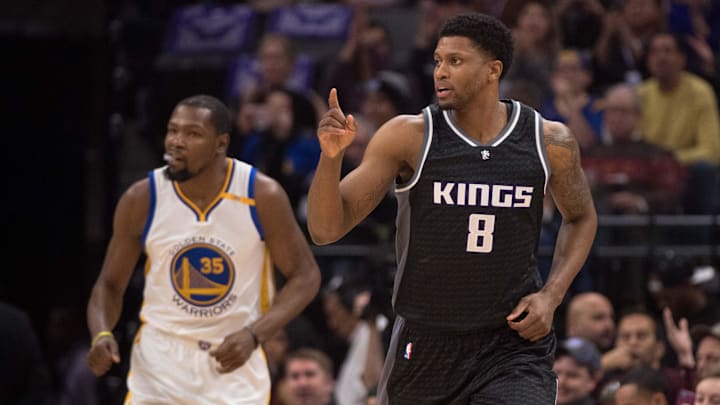On Tuesday, well-respected forward Rudy Gay announced his retirement from the NBA.
After 17 NBA seasons, Rudy Gay is retiring. Gay, the No. 8 pick in the 2006 Draft out of UConn, averaged 15.8 points and 5.6 rebounds across 1,120 career games for the Grizzlies, Raptors, Kings, Spurs and Jazz. pic.twitter.com/5SHPSli761
— Shams Charania (@ShamsCharania) October 29, 2024
Gay spent 17 years in the NBA, including four years with the Sacramento Kings (2013-17). Gay made the All-Rookie team in 2006-07. However, he never earned a single All-Star appearance.
Now that he's retired, the question becomes: will Gay become the next former Kings player to make the Naismith Memorial Basketball Hall of Fame?
Our Methodology
For this post, we are going to answer this question from two different angles. First, we will try to predict how the committee will view Gay's Hall of Fame candidacy. Then, I will reveal my methodology for determining who enters the pantheon of great players and who does not.
What the Hall of Fame selection committee will probably do?
To try and understand what the Hall of Fame committee might do, we need to study their past decisions. Luckily, Basketball Reference has a tool that does a pretty good job of doing that. This metric is known on their website as "Hall of Fame Probability."
Unfortunately for Gay, Basketball Reference's model gives him a 0.0% chance of making the Hall of Fame.
What I Think
Whenever we are having these debates, it is important to identify the difference between "greatest" and "best." Are you trying to figure out who the greatest basketball players of all time are? Or are you trying to figure out who the best is?
For me, the conversation of the greatest of all time encompasses too many arbitrary variables (clutchness, cultural impact, etc.) to be objectively determined. So, I focus on looking for the best players (aka the players who have had the most impact on winning).
For Gay, he was on the wrong end of the analytics movement. In 2013, the Memphis Grizzlies infamously traded Rudy Gay (their leading scorer at the time) and somehow went on to make it all the way to the Western Conference Finals.
The reason for this is that the team realized that Gay's individual offense was hurting the team's overall efficiency. Gay's 17.4 PPG (his average for the Grizzlies during that season) was coming on true shooting efficiency that was 5.7% below the league average.
To his credit, Gay reimagined his game and turned himself into a solid role player. For instance, in 2020-21, Gay finished in the 75th percentile in Estimated Plus-Minus (per Dunks & Threes) – remember, one number metrics measure how well a player performs in their specific role on their specific team – while fulfilling an ancillary position within the San Antonio Spurs' team structure.
With this said, you don't make it into the Hall of Fame by having a handful of seasons as a solid starting caliber player. So, I will have to agree with the Hall of Fame committee here and deny Gay access to the illustrious club.
Still, few players ever get the honor of making it to the Hall of Fame, and even though Gay wasn't one of them, we shouldn't let that get in the way of remembering what was an otherwise successful NBA career.
In four years with the Kings, Gay played 34.5 minutes per night and averaged 19.3 PPG, 6.0 RPG, 2.8 APG, and 1.3 SPG on 55.4% true shooting.
